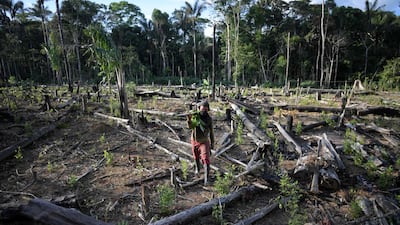France is using its EU presidency to push an anti-deforestation agenda in Europe but the bloc’s proposals face criticism from activists for failing to protect indigenous people.
The idea of the plans is for goods such as coffee, palm oil, cocoa and wood to be imported into the EU only if they are sustainably sourced and did not involve hacking down the forest for agricultural land.
Stopping deforestation is regarded as critical to tackling climate change because trees remove carbon dioxide from the atmosphere and foster habitats for endangered wildlife.
Under the EU proposals, companies would have to provide the geographic co-ordinates where their goods were produced, meaning regulators can check on the status of the forest there.
Some countries would be designated as high risk, subjecting goods that originate there to stricter scrutiny.
The European Commission estimates that these checks could cut 31.9 million tonnes of carbon emissions from the footprint of goods consumed in Europe.
The proposed law was put forward by the commission and needs to be approved by the bloc’s 27 member states. France hopes to use its six-month presidency to move this process along.
French officials said the proposals received a “very positive response” at a meeting of EU environment ministers last week.
Valdis Dombrovskis, the EU’s trade commissioner, told a sustainability conference on Friday that the bloc’s current trade strategy was “the greenest ever”.
“In the coming years, we want to ramp up the capacity of trade and trade policy to support sustainable development,” he said.
Promises to turn the tide on deforestation were among the major outcomes of the Cop26 summit in Glasgow last year.
Counties pledged to use $19 billion ($25.9bn) in public and private finance to restore degraded land, tackle bushfires and protect indigenous people.
But on this last point, campaigners have criticised the EU’s plans for failing to ensure that indigenous people are not exploited.
This is because the proposals only require that the land under scrutiny not be deforested after December 2020, whereas the exploitation of local communities often goes further than merely cutting down trees, activists say.
This includes violence against locals from cattle ranchers, loggers and other intruders, said Puyr Tembe, the head of a federation of indigenous people.
He said the lack of broader standards to be imposed on companies was a “crucial flaw” in the draft legislation.
A letter signed by more than 190 rights groups this week said companies selling products in Europe should be required to consult with indigenous people.
“The EU could play a critical role in transforming the system of economic incentives and curb the human rights abuses that fuel deforestation linked to agricultural commodities,” it said.
“We urge you to improve the European Commission proposed regulation by putting the rights of indigenous peoples and local communities at its heart.”


